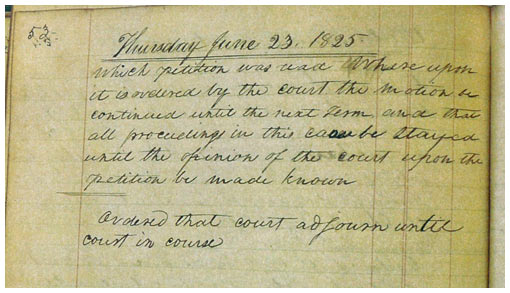|
November 24, 2020

When a day of courtroom work or a trial is completed, the judge will declare that the court is adjourned. Historically, when a court term ended, the judge would declare that court is adjourned until “court in course.” What does this alliterative phrase mean?
Webster’s Dictionary defines “in course” to mean “in regular succession.” The Oxford English Dictionary (OED) defines “in course” to mean “in order, in turn,” but called that definition obsolete. The second definition for “in course” in the OED means “in the regular, usual, natural or due order,” noting that the phrase is more commonly used today as “in due course.” There is no formal definition of “in course” in any of the current or historical law dictionaries: Black’s, Bouvier’s, Abbott’s, or Jacobs’.
In the legal sense, the meaning of adjourning the court until it is “in course” is that the court will meet again at its next regular, successive term. Since court terms, by statute, had specific beginning dates, “adjourned until court in course” means that court will begin again on the first day stipulated in the statute. In the nineteenth century, a circuit court might begin its semi-annual terms, for example, on the second Monday in April and the second Monday in October. When the April term ended, the judge would say the court is adjourned until court in course. The next “course” would be the second Monday in October. The image shown here is from an Illinois Supreme Court term in June 1825.
Court in course is distinguished from the Latin phrase sine die, which calls for the next meeting of a legislature or group at an undetermined day in the future. Courts did not have undetermined term dates.
In Illinois, there is a long tradition of its usage dating back to the very first term of the Illinois Supreme Court in July 1819 in the state’s first capital of Kaskaskia. The phrase was used consistently in the nineteenth century, the twentieth century, and even into the twenty-first century. In the Supreme Court, the practice ended only in the last decade.
Today, most courts are in continuous session and no longer adhere to the practice of vacation, which was the period of time between the end of one term and the beginning of another term, rendering the phrase “adjourned until court in course” to be obsolete, just as the Oxford English Dictionary suggests.
|